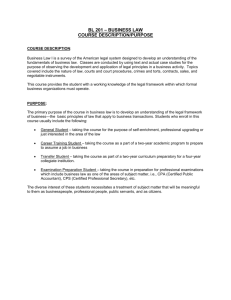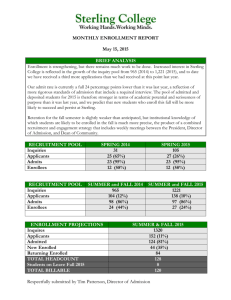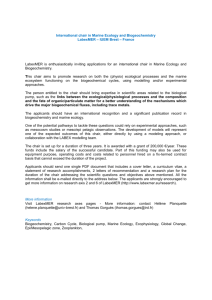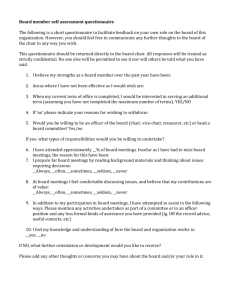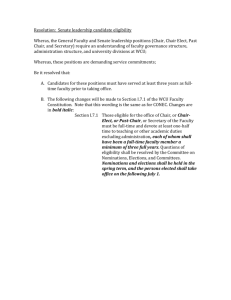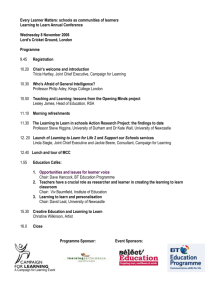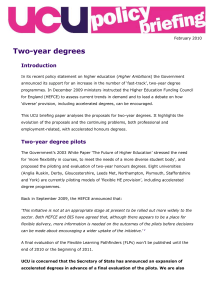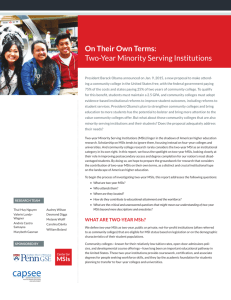How to Make Your Application Stand Out
advertisement
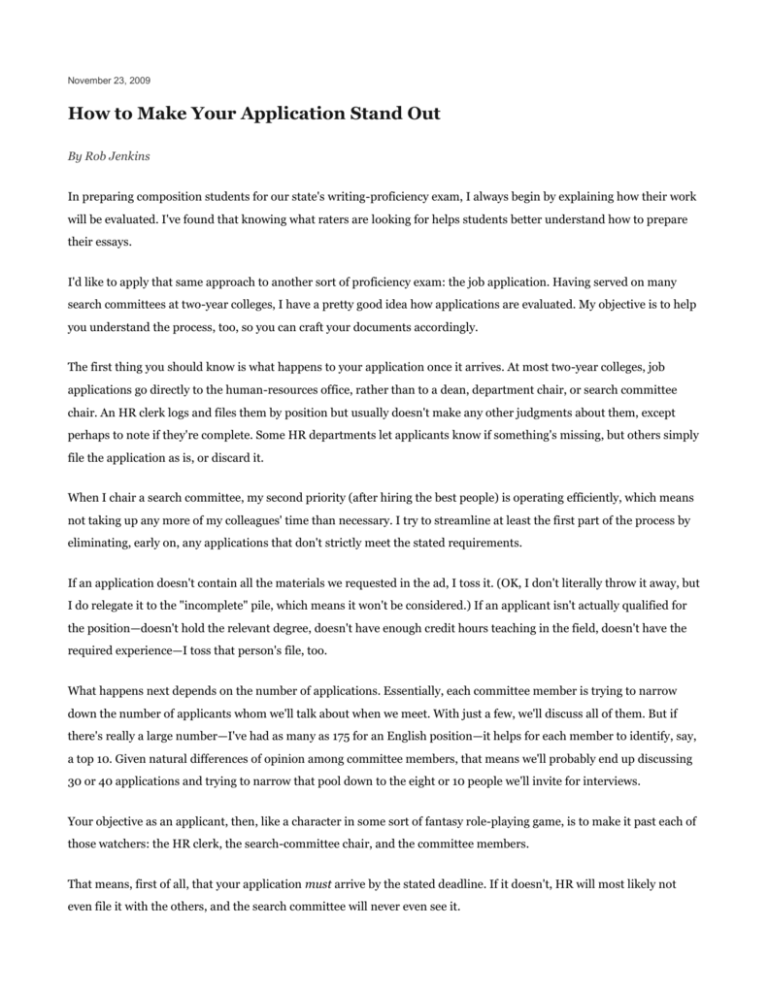
November 23, 2009 How to Make Your Application Stand Out By Rob Jenkins In preparing composition students for our state's writing-proficiency exam, I always begin by explaining how their work will be evaluated. I've found that knowing what raters are looking for helps students better understand how to prepare their essays. I'd like to apply that same approach to another sort of proficiency exam: the job application. Having served on many search committees at two-year colleges, I have a pretty good idea how applications are evaluated. My objective is to help you understand the process, too, so you can craft your documents accordingly. The first thing you should know is what happens to your application once it arrives. At most two-year colleges, job applications go directly to the human-resources office, rather than to a dean, department chair, or search committee chair. An HR clerk logs and files them by position but usually doesn't make any other judgments about them, except perhaps to note if they're complete. Some HR departments let applicants know if something's missing, but others simply file the application as is, or discard it. When I chair a search committee, my second priority (after hiring the best people) is operating efficiently, which means not taking up any more of my colleagues' time than necessary. I try to streamline at least the first part of the process by eliminating, early on, any applications that don't strictly meet the stated requirements. If an application doesn't contain all the materials we requested in the ad, I toss it. (OK, I don't literally throw it away, but I do relegate it to the "incomplete" pile, which means it won't be considered.) If an applicant isn't actually qualified for the position—doesn't hold the relevant degree, doesn't have enough credit hours teaching in the field, doesn't have the required experience—I toss that person's file, too. What happens next depends on the number of applications. Essentially, each committee member is trying to narrow down the number of applicants whom we'll talk about when we meet. With just a few, we'll discuss all of them. But if there's really a large number—I've had as many as 175 for an English position—it helps for each member to identify, say, a top 10. Given natural differences of opinion among committee members, that means we'll probably end up discussing 30 or 40 applications and trying to narrow that pool down to the eight or 10 people we'll invite for interviews. Your objective as an applicant, then, like a character in some sort of fantasy role-playing game, is to make it past each of those watchers: the HR clerk, the search-committee chair, and the committee members. That means, first of all, that your application must arrive by the stated deadline. If it doesn't, HR will most likely not even file it with the others, and the search committee will never even see it. Second, your application must be complete. Read the job ad carefully, then read it again. Include exactly the documents requested. Does the ad call for a CV or a résumé? (There is a difference, and examples of both are available in numerous reference books.) Does it ask for actual reference letters or just a list of references? Does it specify official transcripts or just copies? How about a statement of teaching philosophy? If you don't understand what the ad is looking for, call the college's HR office and ask. But don't just leave something out. Third, make sure you're actually qualified for the job. If the job ad asks for "a master's degree with 18 graduate semester hours in accounting," that's what the committee wants. Perhaps, with a master's in mathematics and three or four accounting classes under your belt, you could easily teach the introductory courses offered at a two-year college, but that's irrelevant. If you don't meet at least the minimum requirements stated in the ad, you won't be considered. My advice up to this point has been pretty basic. But trust me: If you follow it, your application is already looking better than many. There's a good chance you're now in the "to be considered" pool. To take the next step into the "to be invited for an interview" pool, there's one more thing you need to do: Write a killer letter of application. I say "letter of application" because it should be precisely that, and not just a brief "cover letter" noting what's contained in the rest of your application. This letter is your opportunity to set yourself apart from other applicants who meet the basic requirements. Your letter must be long enough to contain real substance but not so long that it becomes irritating. Write at least a page, single spaced, but no more than a page and a half. Your letter should also be professionally produced, using a decent printer, good-quality paper, and a standard businessletter format (again, available in numerous references). The grammar, spelling, and punctuation must be perfect and the writing clear and engaging. In terms of content, the letter should begin by identifying the specific job you are seeking and naming the college. (Yes, that means writing a separate letter for each job—something you should always do, anyway.) End the first paragraph by stating that you believe yourself to be a strong candidate and hope to be given serious consideration. Use the next two or three paragraphs to expand upon your claims to the job—namely, your academic credentials and teaching experience. Even if you don't have a great deal of teaching experience, spend some time talking about the experience you do have. We want to know that you actually enjoy teaching and that you have some idea what you're getting yourself into on our campus. If you have a doctorate, that's great, but don't spend more than two or three sentences discussing your dissertation. By all means, let us know you wrote one (that's still impressive) and tell us what it has to do with your teaching, if anything. But no lengthy exegeses, please. Once you've covered those important areas, you can add a paragraph detailing any other relevant accomplishments, such as teaching awards, publications, and involvement in professional groups. Conclude by referencing your CV or résumé, and asking for an interview. As a serial committee member, I can tell you that if you do all of those things, your application will definitely wind up in my "to be discussed" pile. And that's right where you want it to be. Rob Jenkins is an associate professor of English and director of the Writers Institute at Georgia Perimeter College. He blogs at www.academicleaders.org. http://chronicle.com/article/How-to-Make-Your-Application/49234/

